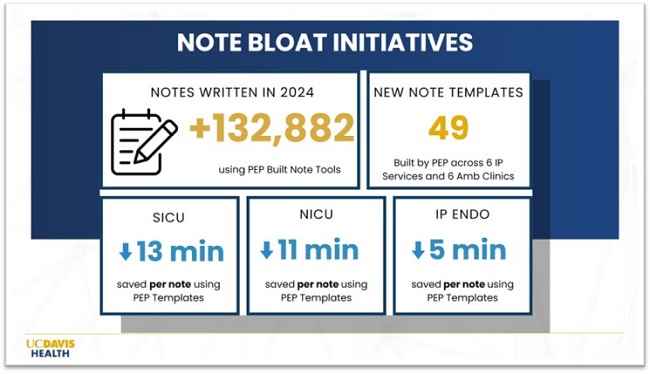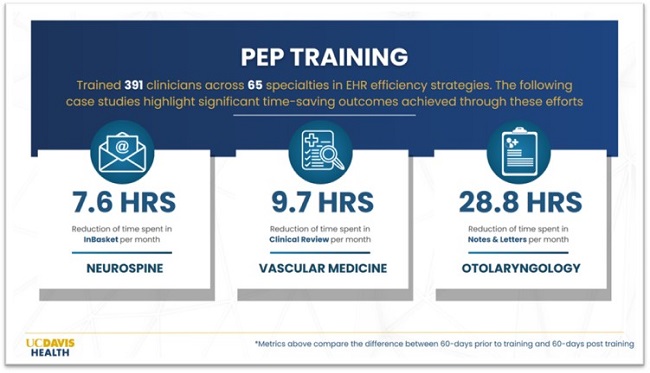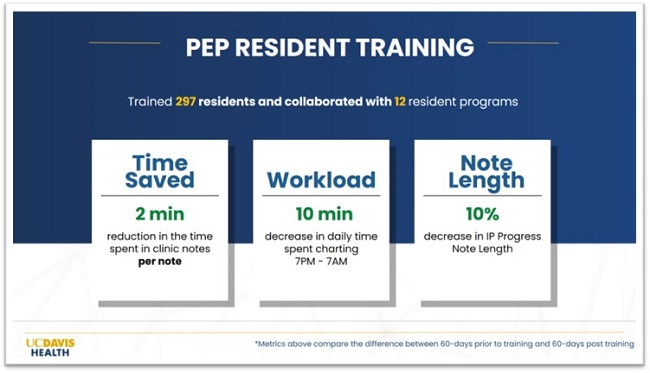A revolution in clinical note-writing at UC Davis Health
UC Davis Health made significant progress in the past year with several Clinical Informatics initiatives involving AI innovations that aim to overcome longstanding burdens in clinical documentation – with the goals of easing workflows and enhancing patient experiences.
Clinical Informatics’ 2024 Annual Report describes a successful AI Scribe pilot project early last year that was eventually expanded to a system-wide level late last year. As envisioned, AI Scribe benefits patients by allowing their health care provider to focus fully on their concerns during a visit, leading to more personalized attention, better communication, and a more positive patient experience made possible by less physician note-taking distractions.
The idea is to ultimately improve patient engagement while also reducing the burdens of clinical documentation. At UC Davis Health, AI Scribe is now serving 350 licenses, 57 supporting specialties, and has generated more than 54,000 notes with more than 4,000 per week.
Significant impact on documentation
Melissa Jost, Director of Clinical Informatics, said, “The ever-evolving landscape of clinical informatics challenges us to innovate, adapt, and find meaningful ways
to support our clinicians in delivering exceptional patient care.”
This year, she said, Clinical Informatics tackled one of the most persistent challenges in health care – clinical documentation burden, or note-writing, in other words.
“Through new note templates, chart review tools, and deployment of AI Scribe technology, we streamlined note-writing and made it easier for clinicians to review and synthesize clinical information,” Jost said.
This success was only possible through collaboration with clinician partners, operational leaders, and internal teams, she added.
“From piloting the technology to fine-tuning it based on real-world use, UC Davis Health’s commitment to deploying safe and accurate AI Scribe tools to our clinicians has been inspiring. We’ve seen measurable results in reduced documentation time and cognitive load, and these outcomes demonstrate the real-world impact of our work,” Jost said.
Training, collaborations
AI Scribe was just one of six projects that Clinical Informatics undertook in 2024 through its Practice Experience Program, or PEP. Their team of analysts aim to deliver tools and share knowledge that UC Davis Health providers will find helpful in navigating Epic and optimizing EMR workflows.
The other projects included:

- ED Charge Capture and Note Optimization: Dr. Aman Parikh led a strategic initiative focused on enhancing revenue for ED Physician Services by improving charge capture and streamlining documentation processes.
- Physician Builder Epic Enhancements: Clinical Informatics physician builders completed Epic system enhancement projects to support safety, effectiveness, and quality.
- ACP and JGME Publications: The Performance Measurement and Medical Informatics Committee demonstrated national influence by engaging in discussions with CMS and contributing to the field with four published peer-reviewed papers.
Creating greater time-savings on documentation tasks for clinicians involves training sessions on electronic heath records technologies.

For example, in the neurospine specialty, 7.6 hours were reduced per month in the time spent on “InBasket” processes; 9.7 hours were reduced per month in vascular medicine clinical reviews; and 28.8 hours were reduced per month in Otolaryngology’s note and letters processes.


For more information, view Clinical Informatics’ 2024 Annual Report and read a recent article on the AI notetaking pilot at UC Davis Health.





